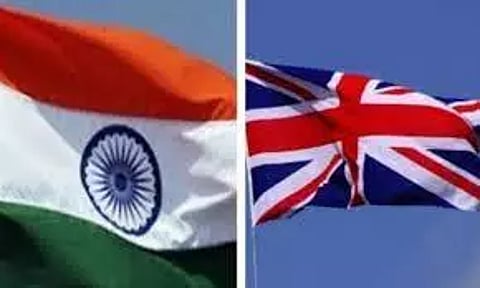

NEW DELHI: As India and the UK inch closer to sealing a free trade agreement, a forthcoming book says the pact is critical for India’s ambition to become a manufacturing powerhouse while the UK seeks to clinch new deals to highlight the benefits of Brexit.
In his forthcoming book “The Reverse Swing-Colonialism to Cooperation”, veteran journalist Ashok Tandon noted that the Free Trade Agreement(FTA), if clinched, will come at a time when many western economies are pinning their hopes on India to become a bulwark against China’s growing economic and military clout.
The book by Tandon, a former PTI bureau chief in London, called the FTA a “most ambitious, fair and balanced” pact which would help the two countries to further enhance bilateral commerce and investments. The book is scheduled to be released here on October 18.
Officials of India and the UK are holding hectic parleys to conclude the negotiations for the FTA. The talks were launched in January 2022. There are expectations that the pact could be signed by the end of this month.
India and the UK are looking at a possible visit to New Delhi by British Prime Minister Rishi Sunak soon but it may finally depend on whether the two sides could resolve the remaining differences to firm up the much-awaited FTA.
Tandon, who was in-charge of media relations in the PMO during the tenure of Prime Minister Atal Bihari Vajpayee(1998-2004), noted that India and Britain are concluding a ‘fair and balanced’ pact based on “equality, mutual respect and commonalty of interests”.
This aligns with the common vision outlined in the Indo-UK Roadmap-2030, a comprehensive strategic partnership between the two democracies, he said.
The FTA, when signed, will reflect a “common vision of a new and transformational comprehensive strategic partnership between India and the UK”, according to the book.
Prime Minister Narendra Modi and Sunak are pushing to double Indo-UK trade by 2030 through the proposed agreement that seeks to slash customs duties and increase market access.
The bilateral trade increased to USD 20.36 billion in 2022-23 from USD 17.5 billion in 2021-22.
The two governments hope to conclude the ambitious Indo-British FTA as early as possible, Tandon said, adding the deal is crucial for India, which hopes to become a bigger exporter of multiple products to the UK.
On the other hand, after losing access to the EU (European Union) single market, the UK would want to develop strong trade relations with emerging markets around the world and India, with strong economic fundamentals and a large domestic market, is in a better position, he said.
Moreover, the book noted that India is a significant Foreign Direct Investment (FDI) source for the UK because many Indian firms have tapped it as a gateway to the EU single market.
Initially, after exiting from the EU, the UK wouldn’t like to lose Indian investment, it said, adding the UK will attract Indian firms by offering more incentives such as tax breaks, relaxed regulations and opening up markets.
“As investors look around the world for safe havens in these turbulent times, India stands out both in terms of stability and of growth. The UK accounts for 17 per cent of India’s Information Technology (IT) exports.'' Similarly, the UK is also the third-largest FDI source for India. There are more than 800 Indian companies in Britain.
“Although Brexit has had some negative effects on the Indian economy, it brings with it the myriad opportunities of growth for Indian industries. India just needs to be watchful and capitalize on whatever opportunities come its way,” the book said.
These are also one of the key reasons for the two sides to work towards finalising the agreement at the earliest, it noted.
As the EU and the UK both look for new trade opportunities elsewhere, India could emerge as a beneficiary of this new arrangement, the book said.
Further, it said the trade pact is expected to benefit various sectors, including information technology, where the UK accounts for a substantial portion of India's exports. The pact could also boost India's export of petroleum products, gems, jewellery, cotton, fabric, electronics, and plastic items.
The UK hopes to enhance exports to India of among other things its premium cars, Scotch whisky and services, such as legal. The UK government estimates that the FTA could significantly contribute to its GDP growth, projecting an increase of about £3.3 billion in 2035, potentially rising to £6.2 billion, depending on the magnitude of the agreement.
However, challenges remain, especially concerning the sensitive issue of visas. India’s key demands include smooth movement of skilled professionals, while the UK, influenced by the Brexit vote, remains cautious about immigration policies.